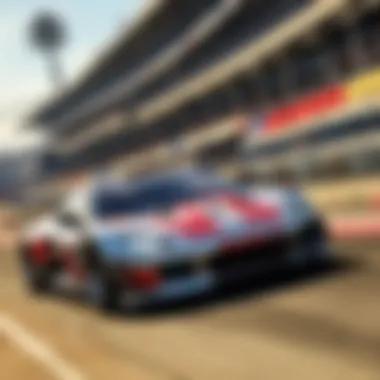Gran Turismo for Xbox One: A Comprehensive Analysis


Intro
Gran Turismo, the iconic racing simulation series, has historically stood apart due to its meticulous attention to detail and car culture. However, despite the game’s long-standing success, it has remained absent from the Xbox One platform. The absence of this franchise leaves gamers on this console searching for alternatives while pondering the implications of Gran Turismo’s significant legacy.
In this analysis, we explore the intricacies surrounding Gran Turismo, its gameplay dynamics, and how it has been received within gaming circles. Examining alternative racing titles tailored for the Xbox ecosystem becomes essential to understand what gamers can experience in the absence of this hallmark series. Furthermore, we analyze the potential developments that can help fill the void that Gran Turismo leaves behind and evaluate the wider implications of its absence for rival platforms like Xbox.
Through this deep dive, we aim to equip readers with a comprehensive understanding of Gran Turismo's strengths and its pivotal role in racing simulations, enhancing their gaming journey, while illuminating the future landscape of this genre.
History of Gran Turismo
Gran Turismo originally launched in 1997 for the PlayStation and rapidly captured the hearts of racing enthusiasts. It set new standards in terms of realism and authenticity that have shaped the development of racing games since. The franchise has effectively pioneered driving physics, graphical fidelity, and an impressive roster of vehicles.
Each subsequent release provided enhancements and evolved gameplay mechanics that allowed the series to remain relevant. Key milestones along Gran Turismo's journey include the launch of Gran Turismo 2 in 1999, Gran Turismo 5 in 2010, and Gran Turismo Sport in 2017. With each title, Polyphony Digital, the game's developer, successfully pushed the envelope for car simulation experiences, resulting in deeper engagement among players.
As the gaming landscape changed, Gran Turismo faced challenges bringing the franchise to new platforms. The focus shifted from strictly simulation to accommodate more arcade-style experiences due to the rising popularity of competitors like Forza. Yet, Gran Turismo's dedication to realism marked it as a singular experience in the driving genre.
In summary, the evolution of Gran Turismo showcases how traditional racing elements can substantially impact not just enthusiast groups, but the industry at large. Its absence from the Xbox One serves as a crucial point of discussion, prompting inquiries into both community sentiment and potential replacement opportunities available for Xbox gamers.
Gameplay Mechanics
The core gameplay of Gran Turismo is heavily rooted in precision and verisimilitude. It immerses players in a driving experience unlike many arcade racers due to its focus on painstakingly accurate vehicle behavior and physics representation. Each car in Gran Turismo has its own distinct handling, performance aspect, and behavior that reflects its real-world counterpart.
For players accustomed to console racing games, adapting to the driving mechanics of the Gran Turismo series could require some adjustments. Key gameplay features include:
- Cars: There is an extensive collection of vehicles, from everyday cars to top-tier racing machines which allows personalization through numerous tuning options.
- Tracks: Real-life circuits and fictional tracks provide diverse racing environments; players benefit from learning track layouts for improved performance.
Improvements to gameplay experience can be essential. Players new to the series may want to practice in lower classes to familiarize themselves with handling. Furthermore, utilizing the game's extensive tuning options can enhance competitive performance, no matter the player's initial skill level.
Understanding driving lines, managing break points, and using the correct throttle control can be useful tips for any serious contender within this simulation realm.
Community Reactioons
While Gran Turismo’s absence on Xbox might seem dull, passionate community members have charted their pathways through Cup competitions, online forums, and social media technologies, enjoying competitive racing through alternating itles such as Forza Horizon and Project Cars. Players have expressed frustrations and nudged towards discussions regarding cross-platform opportunities as online participation needs grow imperatively.
Thus, addressing the community request for a Gran Turismo presence on Xbox becomes crucial for any analyst engaged with the racihg gaming realm.
There remains an essential acknowledgement of exactly where racing games originally prosper beyond stylistic enforcement to the core constituents who drive sustained interest and loyalty.
As we analyze the broader intake amidst alternative available simulators, gamers on the Xbox enjoy comprehensive choices, however, none parallels to Gran Turismo's signature attributes of intricacy and sophistication.
In the absence of this franchise, it leads stalwarts of this genre to revisit previous favorites. Potential innovations in racing simulations could forge paths toward a hopeful outlook in filling joys of community rounds relating the historically regarded franchise.
Prolusion to Gran Turismo
Gran Turismo is a cornerstone in the racing sim genre, establishing its reputation through meticulous attention to detail, realistic driving experiences, and a wide array of licensed vehicles. The importance of this section is multifaceted. By exploring the early historical significance of Gran Turismo, readers gain context on how this franchise has shaped the racing game landscape and November 2021 marks the return of interest surrounding these mechanics. Understanding Gran Turismo's evolution highlights technological advancements in gaming and how they propagate user engagement.
Historical Significance of Gran Turismo
Since its original release in 1997 on the PlayStation, Gran Turismo has been more than a game; it has been a cultural phenomenon. It pioneered aspects like real-world physics and extensive car customization within the racing genre. Games prior lacked the depth that Gran Turismo provided, often focusing on arcade-like experiences rather than simulating lifelike racing dynamics. Some attributes were even directly involved in establishing new player expectations for racing titles.
The franchise’s authentic representation of vehicles also struck chords with car enthusiasts. From brands like Ferrari to BMW and Toyota, it allowed players to drive cars they admired in real life, pouring effort into making the driving experience faithful. Gran Turismo didn’t just stop at being a commercial product; it acted as an educational resource about automotive engineering and motorsport culture. For these reasons, its historical significance remains vital to comprehend the narrative of racing games as a whole and to appreciate the ongoing relevance in today’s gaming forums.
“Gran Turismo transcended conventional racing games, creating a standard that today's titles still pursue.”
Gran Turismo's Evolution Through Video Game Eras
Each iteration of Gran Turismo follows an upward trajectory in technical achievement, particularly with graphics, physics, and artificial intelligence. Starting on the first PlayStation, improving elements like car handling and track design reflected innovations sustainability. The arrival of online capabilities in the installments deepened communal gameplay experiences, allowing users to compete against one another far beyond local circle competition.
In successive releases, such as Gran Turismo 3: A-Spec and Gran Turismo 5, the technology advanced remarkablely. Additional car customization options, photo mode features, and an increase in licensed cars were integrated into overall mechanics. Online features further enhanced racing beyond singular experiences: leaderboards, forums, and the opportunity to compete internationally emerged.


Transitioning from the PlayStation captive audience, the franchise's identity profoundly changed with Gran Turismo Sport. This title leaned towards emphasizing competitive racing, inviting e-sports as a visible platform. Understanding these multiple transition eras illustrates adaptability, ensuring longevity despite shifting market needs.
This evolution compels reflections on Gran Turismo's influence, culminating in examining why it has not evolved alongside Xbox ecosystems. Existing titles during earlier generations further plunge in retrospective exemplifying gradual changes into the gaming philosophy.
Gran Turismo and the Xbox Ecosystem
The Absence of Gran Turismo on Xbox One
Gran Turismo stands as a cornerstone in racing simulation games, offering profound gameplay mechanics and unrivaled realism. However, its absence on the Xbox One platform poses significant questions regarding the preferences of Xbox gamers. With Gran Turismo, developed by Polyphony Digital, it became synonymous with impeccable graphics and an extensive selection of vehicles, rivaling even the most high-end racing simulators.
When Xbox One users consider racing games, the lack of Gran Turismo can create a sense of exclusion. They miss not only a beloved title but also its highly anticipated features. Gran Turismo encourages a deep investment in vehicle performance, choosing appropriate tuning and conditions for different tracks.
Moreover, the absence of this game limits the Xbox fan base’s experience with car culture and digital motorsport. Many racing enthusiasts hope for a robust racing solution on their console. Their yearning for a game that meets high standards of performance, creativity, and style remains unfulfilled. This need drives players to seek alternative titles, leading to a quest that could prove a complex process.
Comparative Analysis with PlayStation Platforms
The comparison between Xbox and PlayStation platforms reshapes the conversation about Gran Turismo's significance. PlayStation has built a reputation for delivering high-quality racing games. While Gran Turismo thrives on that platform, Xbox gaming density often shifts towards racing titles like Forza.
Look at the duplicitous influences these games exert. On PlayStation, Gran Turismo captivates player attention through finely crafted physics and comprehensive car works. It holds a unique nostalgia and loyalty within the community. Meanwhile, Xbox's approach, represented by Forza, takes a distinctly avant-garde twist. Xbox users experience a perfect blend of arcade-like excitement and simulation realism. This creates a divergent path in the racing game philosophy.
Factors to consider in this comparison are:
- Graphics and Physics: Gran Turismo emphasizes a meticulous depiction of cars and tracks.
- Gameplay Style: Gran Turismo caters to a simulation market while Forza blends simulation and arcade aspects.
- Community and Modding: Gran Turismo features dedicated support and results in a feverish online community, while Xbox racing titles adapt various virtual race scenarios.
Ultimately, Gran Turismo's exclusion from Xbox reflects broader competitive dynamics in gaming. What effect does it have as tech evolves? This only amplifies discussions about the necessity and demand of high-end racing games like Gran Turismo in an Xbox ecosystem accustomed to different flavors.
Alternative Racing Games on Xbox One
Exploring alternative racing games on Xbox One is crucial for gamers who are looking for diverse experiences in the racing genre, especially in the context of Gran Turismo. The absence of Gran Turismo means Xbox players must seek other options to satisfy their racing desires. These alternatives often feature unique mechanics, different driving styles, and various customization features that provide players with substantial entertainment and engagement.
Key considerations include:
- Gameplay Variety: Each title offers distinct gameplay that varies the racing experience.
- Community Engagement: Different racing titles have loyal fanbases, contributing to forums and communities.
- Competitor Analysis: Understanding strengths and weaknesses gives players a broader perspective on their options.
Overview of Competing Titles
Many racing games fulfill the niche left by Gran Turismo. Some key titles to consider on the Xbox One include:
- Forza Horizon 4: A dynamic, open-world racing game focused on exploration, allowing players to roam scenic environments.
- Forza Motorsport 7: Recognized for its realistic driving dynamics and extensive car customization options.
- DiRT 5: An off-road racing game that brings an arcade feel with colorful graphics and a variety of challenges.
- Need for Speed Heat: This option emphasizes street racing and contains a rich narrative experience combined with illegal street racing elements.
Each title comes with its promise of engaging gameplay and community integration, offering much for racing enthusiasts.
Strengths and Weaknesses of Competitors
By evaluating the competing racing games, a clearer picture emerges. Below are some pertinent strengths and weaknesses:
Forza Horizon
Strengths:
- Open world with vast landscapes and beautiful graphics.
- Contains a blend of arcade-like fun with racing simulation, making it accessible.
- Exciting seasonal changes that affect gameplay.
Weaknesses:
- Less focused on technical racing compared to Gran Turismo.
- Less simulation in terms of tire wear and fuel management.
Forza Motorsport
Strengths:
- Known for its AAA graphics and realistic physics.
- Wide collection of vehicles available for selection.
- Deep options for vehicle tuning.


Weaknesses:
- Limited to track racing, lacking the open-world elements.
- This can lead to a less diverse experience over time.
DiRT
Strengths:
- Fast-paced and thrilling experience, especially for adrenaline seekers.
- Diverse game modes and off-road challenges.
Weaknesses:
- Graphics can sometimes be less polished than competitors.
- May not appeal to traditional racing simulation fans.
Need for Speed Heat
Strengths:
- Strong narrative element engaging players beyond racing.
- Extensive customization options for vehicles.
Weaknesses:
- Gameplay can feel repetitive after many hours.
- Major on story, leading to dilution of racing realism.
Evaluating these titles can help players find which racing games best match their preferences, compensating in various ways for the absence of Gran Turismo on the Xbox platform.
Gameplay Mechanics and Features
In the realm of racing simulations, gameplay mechanics and features stand as a critical pillar. Without them, an experience may fall flat. This article specifically focuses on how Gran Turismo has defined these elements and how their absence on Xbox One reshapes the racing game landscape. Key to grasping Gran Turismo's impact is understanding its niche in precision and realism in driving mechanics, customization capabilities, and diversity in vehicle selection.
Driving Dynamics and Physics
Driving dynamics incorporates aspects that make players feel the road, the car, and the environment. Physics engines govern how vehicles behave under various conditions. In previous Gran Turismo titles, these dynamics have often been lauded for their attention to realism. The force feedback allows players to sense how the car reacts as they navigate complex circuits.
Players have provided feedback on nuances such as steering response and tire grip indices. These elements define the Gran Turismo experience. Without them, racing games risk becoming arcade-like experiences that neglect the level of skill needed in real-life racing.
Important factors in driving dynamics include:
- Tire Models: Realistic tire performance based on conditions.
- Suspension Behavior: Effects of vehicle suspension on handling and grit.
- Weight Transfer: How movement affects traction and drift mechanics.
Each factor interacts to form a comprehensive racing simulation that engages players not merely in speed but in strategy and mastery of their vehicles. Without Gran Turismo on Xbox One, this nuance might be less accessible.
“Driving dynamics is not just about speed; it is about mastering control and feeling one with your machine.”
Customization Options and Vehicle Selection
Customization options are a hallmark of the Gran Turismo series. They not only allow personalization but also impact gameplay more broadly. Offering a vast array of cars, tracks, and modifications, players can tailor their experience as they see fit. This feature is increasingly vital in racing simulations, where player attachment to vehicles significantly enhances the ownership experience.
Customization can include alterations such as:
- Performance Upgrades: modifications for engine output, brakes, and suspension.
- Aesthetic Changes: choices in paint jobs, decals, and car interiors.
- Fine-Tuning Settings: adjusting aerodynamic features to improve handling.
The diversity in vehicle selection further expands gameplay by inviting players to explore unique atmospheres and styles of racing. Working with different cars and tuning options, players can develop techniques corresponding to each vehicle's handling, thereby deepening their investment in the sport. In the context of Xbox One, the lack of Gran Turismo's adaptive approach to customization disparities with potential racing titles that merely offer standard static options.
The critical relationship between customization and player engagement highlights why this feature is integral to the genre. While other games may offer basics, only a few reach the depth found in Gran Turismo. The absence of this experience on Xbox may prove limiting for dedicated racing fans.
Community Reception and Fanbase Insight
Understanding how a game is received by the community is crucial in its overall evaluation. In the case of Gran Turismo's absence on the Xbox One, examining community reception reveals insights about gamer priorities, the significance of brand loyalty, and unmet expectations. The community surrounding racing games is passionate, compelled by a blend of technical simulation, realism, and competitive spirit. This analysis unpacks these elements and thus aggregates different perspectives that elucidate the broader context of racing games on Xbox.


Examination of Community Forums and Discussions
Community forums, gaming blogs, and social media platforms like Reddit and Facebook serve as barometers for evaluating players’ feelings regarding Gran Turismo and how the lack of this title affects their racing experience on Xbox One. In these spaces, discussions often reveal deeper sentiments driven by nostalgia and anticipation. For many, Gran Turismo represents not just a game, but an entire ecosystem encompassing simulation racing. Members often share their full experiences of other racing games, making comparisons to Gran Turismo’s hallmarks.
Most discussions encapsulate sentiments like:
- Level of detail in simulation: Members cite the precision of driving dynamics and car customizations unique to the iconic franchise.
- Evolving trends in racing games: The growing demand for accessibility and authentic racing experiences pushes gamers to seek alternatives, reshaping community expectations.
- Engagement in multiplayer environments: Users mention how racing games thrive on community interaction—and the void left by Gran Turismo is noticeable.
Community insights not only highlight the desire for Gran Turismo on Xbox but also provide developers insight into features fans cherish the most.
Impact of Gran Turismo's Absence on Xbox Gamers
The void left by Gran Turismo on Xbox gamers' experiences is immense. Without a flagship title, players turn to other racing games for their fix, many expressing a sense of loss over the Gran Turismo series' sophisticated gameplay elements. The absence holds implications for both gamers and developers in the ecosystem.
Several consequences emerge from this absence:
- Bifurcation of Interest: Many racers on Xbox gravitate towards alternative titles like Forza Horizon 4 or Project Cars 2, forcing dedication to other brands.
- Deficiency of Realism: Some argue that without Gran Turismo, there is less focus on hyper-realistic driving simulations available on Xbox—key for serious racing enthusiasts.
- Community Splintering: The passionate gamers hail Gran Turismo, and with its absence, divides form within the community discussing differing game systems with distinct racing philosophies.
Ultimately, these blogs reveal an unmet demand for a racing simulation powerhouse like Gran Turismo on the Xbox One. This occurrence encourages discussion on future possibilities—and hopeful gamers may hold views that developers cannot ignore.
Future Prospects for Racing Games on Xbox
Future prospects for racing games on the Xbox platform bring several intriguing elements to explore. With racing game enthusiasts looking for an immersive experience, there is a demand for more advanced features and functionality. As technology progresses, developers are in a position to elevate the gaming experience traditionally seen in titles like Gran Turismo. Understanding the shifting dynamics leads to insights into what might be next for games in this genre.
The integration of next-gen graphics and adaptive gameplay mechanics plays a pivotal role in shaping the future of racing games on Xbox. Innovations such as virtual reality support or an enhanced open world exploration offer fans opportunities beyond just structured races. With this advancement, games can simulate realistic physics and driving dynamics that appeal to both casual players and hardcore fans alike.
Potential Developments and Innovations
The landscape for racing games is boundless with potential developments and innovations. Future updates can include better AI and smooth multiplayer experiences, ensuring any racing game on Xbox can dynamically adjust to varying skill levels among players. Additionally, the role of cloud gaming cannot be underestimated. As more gamers embrace platforms like Xbox Cloud Gaming, the ability to play high-quality titles without the need for a dedicated console leads to accessibility.
Incorporating environmental factors, such as changing weather conditions and day-night cycles, can enrich player engagements and challenges. These factors could enhance immersion, making players feel like they are truly part of the racing universe. Some innovations worth considering include:
- Advanced vehicle physics for better handling
- Detailed environmental interactions, like terrain affecting speed
- AI learning algorithms that adapt to player behavior over time
- Expanding to electric vehicles alongside traditional race cars
The Role of Fan Feedback in Game Development
Fan feedback is crucial for shaping the direction of racing games on Xbox. Developers often look to community input to tailor their releases more to player expectations. Engaging in open discussions does not only foster a connection between developers and fans but also guides future updates and enhancements.
The reality is that specific requests often translate to substantial developments. From community forums to Reddit discussions, gaming industries benefit greatly from understanding what players favor or critique in existing games. Ignoring community sentiments can lead to lackluster titles failing to capture audience interest.
The engagement typically highlights:
- Preferred gameplay features: Insights on what mechanics work well and which need revisiting.
- Desired enhancements: Requests for varied customization options or new racing tracks.
- Bug reporting: Players provide notice on what issues disrupt their gaming experience.
Culmination
The exploration of Gran Turismo's influence, particularly in relation to Xbox One, serves as a critical lens into the broader racing game ecosystem. In this article, key insights emerge that justify this examination:
- Significance of Absence: The absence of Gran Turismo highlights the limitations players face within the Xbox platform, setting the stage for alternative games.
- Comparative Features: Analyzing Gran Turismo in the light of its features against other racing games helps to clarify what makes it distinct.
- Community Engagement: Understanding community reactions provides a nuanced view of how significant these trends are among dedicated racing fans.
- Future Innovations: Looking forward, the potential for growth and innovation within racing games enables players to fuel their expectations.
Though Gran Turismo traditionally streams through PlayStation, its impact is indisputable in a comparative sense. Its technological advancements have shaped player expectations and redefined genre standards. Racing mechanics that players yearn for can be understood through the lens of Gran Turismo, while alternative titles would need to evolve. Here's where an understanding of its impact matters greatly.
Recap of Key Points Discussed
Throughout the article, various components of Gran Turismo's narrative have been analyzed. Points discussed include:
- Historical significance and evolution of the game series.
- The unique situational absence within the Xbox One ecosystem.
- Overview of competitive racing games on the platform with their respective attributes and flaws.
- Gameplay mechanics, examining driving physics and vehicle customization in detail.
- Insights stemming from community discussions, highlighting the social dynamics surrounding Gran Turismo's availability.
- Future directions in the racing genre and how player feedback could shape them.
These points create a rounded view on racing simulations and Gran Turismo's sqrt in this demographic, leading to crucial findings for Xbox One experts and gaming enthusiasts.
Final Thoughts on Gran Turismo's Impact
Gran Turismo's developments resonate deeply within gaming, urging players to pursue the most refined and authentic racing experiences. While the franchise does not exist on Xbox One, its legacy continues to channel players.
Décisions made by developers can be influenced indirectly by the monumental success that Gran Turismo garnered. Genres bend around player preferences, so consumer demand can spark significant changes even to competing titles. Through seizings like vehicle realism, hands-on customization, and competitive engagement in racing communities, the footprint of Gran Turismo persists.
Motion and evolution, both served well by Gran Turismo, set the foundational tone for future racing games on platforms that lack this flagship title. Regardless of platform choice, its lineage catalyzes interest and pushes boundaries to mint more definitive racing simulations for passionate fans everywhere.



